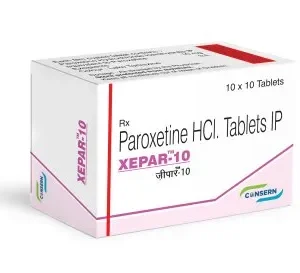Lexapro 10 mg
Lexapro 10 mg, known generically as escitalopram, is a widely prescribed antidepressant that belongs to the class of medications called selective serotonin reuptake inhibitors (SSRIs). Approved by the U.S. Food and Drug Administration (FDA), Lexapro is primarily used to treat major depressive disorder (MDD) and generalized anxiety disorder (GAD). It works by increasing the levels of serotonin, a natural substance in the brain that helps maintain mental health balance. Because of its efficacy and relative safety, Lexapro has become a cornerstone treatment option for many individuals dealing with mood disorders.
Product Description
Lexapro is available in both tablet and liquid oral solution forms. The tablets typically come in 5 mg, 10 mg, and 20 mg strengths. The medication is usually taken once daily, with or without food. Lexapro functions by inhibiting the reabsorption (reuptake) of serotonin in the brain, thereby increasing serotonin levels, which can improve mood, sleep, appetite, and energy levels while decreasing symptoms of anxiety and depression.
Positive Uses of Lexapro
- Major Depressive Disorder (MDD)
Lexapro is primarily used to treat MDD in adults and adolescents aged 12 and older. It helps alleviate symptoms such as persistent sadness, loss of interest in daily activities, feelings of worthlessness, and fatigue. Many patients report noticeable improvements in mood within the first 1–4 weeks of treatment. - Generalized Anxiety Disorder (GAD)
Lexapro is also effective in reducing symptoms of GAD, such as excessive worry, restlessness, and physical symptoms like muscle tension and irritability. It can improve both psychological and physiological symptoms of anxiety. - Other Off-Label Uses
Although not FDA-approved for these conditions, Lexapro is sometimes prescribed off-label to treat:
- Panic disorder
- Obsessive-compulsive disorder (OCD)
- Social anxiety disorder (SAD)
- Post-traumatic stress disorder (PTSD)
- Premenstrual dysphoric disorder (PMDD)
Possible Side Effects of Lexapro Like all medications, Lexapro can cause side effects. Most are mild to moderate and may improve as the body adjusts to the medication.
Common Side Effects:
- Nausea
- Drowsiness or fatigue
- Insomnia
- Dry mouth
- Increased sweating
- Dizziness
- Constipation
- Weight changes
- Decreased sexual desire or performance
Less Common but Serious Side Effects:
- Suicidal thoughts (especially in young adults under 25)
- Serotonin syndrome (when combined with other serotonergic drugs)
- Abnormal bleeding
- Low sodium levels (hyponatremia)
- Seizures
- Manic episodes in individuals with bipolar disorder
Managing and Handling Side Effects
- Start Low and Go Slow
To minimize side effects, doctors often recommend starting with a lower dose and gradually increasing it. This approach allows the body time to adjust to the medication. - Dealing with Nausea
Taking Lexapro with food can help reduce nausea. Ginger tea or anti-nausea remedies can also be helpful during the initial adjustment period. - Handling Sleep Issues
If Lexapro causes insomnia, it may help to take the medication in the morning. Conversely, if it causes drowsiness, taking it at bedtime may be more appropriate. - Managing Sexual Side Effects
If sexual dysfunction becomes a concern, discuss alternatives or adjunct treatments with a healthcare provider. Sometimes, adjusting the dose or switching to a different antidepressant may resolve the issue. - Combating Dry Mouth
Chewing sugar-free gum, sipping water throughout the day, and using saliva substitutes can help alleviate dry mouth. - Monitoring for Serious Reactions
Anyone starting Lexapro should be closely monitored for mood changes, especially during the first few weeks of treatment. If signs of serotonin syndrome appear (confusion, rapid heartbeat, fever, or hallucinations), seek immediate medical attention. - Gradual Discontinuation
Never stop Lexapro suddenly without medical supervision. Doing so may lead to withdrawal symptoms such as dizziness, irritability, nausea, and electric-shock-like sensations. A gradual tapering process is essential when discontinuing.
Who Should Avoid Lexapro?
Lexapro may not be suitable for individuals who:
- Have a history of allergic reactions to escitalopram or citalopram.
- Are currently taking monoamine oxidase inhibitors (MAOIs).
- Have a history of bipolar disorder (unless under strict medical supervision).
- Are pregnant or breastfeeding (consult a doctor before use).
Conclusion
Lexapro is a powerful and effective medication for managing depression and anxiety. When taken as prescribed and monitored carefully, it offers substantial relief to many individuals, improving overall quality of life. While side effects can occur, most are manageable and tend to decrease over time. Patients are encouraged to maintain open communication with their healthcare providers to adjust treatment plans as needed and ensure the safest and most effective use of the medication.
Lexapro is not a one-size-fits-all solution, but for many, it provides hope and healing in the journey toward mental wellness. Always consult a medical professional before starting or stopping any medication.





Reviews
There are no reviews yet.